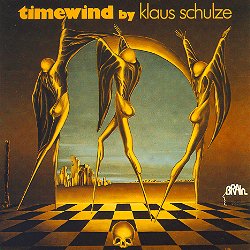| Discography |
 |
Reviews |
| »Timewind: ...better than his earlier Blackdance.« (Karl Dallas, "Melody Maker", England, 4 October 1975) |
|||
| »Klaus Schulze is setting himself quite a target these days. The ex-drummer turned electronic
maestro says his current music is intended as a connection between dead machines and living
people. That's quite a connection, and one that has given rise to some interesting sounds on his
latest offering. How far those sounds aspire to being music is debatable, and I was left wondering
what Richard Wagner, to whom the album's dedicated, would think about it. As for the sounds themselves, they are haunting and interesting enough. Side one, in particular, engenders a weird, slow-gathering tension which reveals Schulze's obvious talent with electronics, and ends on a crashing note. It is certainly more than just mere mood music ... It is an introverted enigmatic world, a world in which there is always the danger that only the artist himself knows what he is doing and why. Perhaps that's just how Schulze wants it.« ("Cumberland Evening News & Star", England, 11 October 1975) |
|||
| »... Le sorcier Schulze a encore pris posession de votre être. Quelques petites remarques
seulement, au milieu du brouillard où Klaus vous a jeté: les faces sont d'une longueur inhabituelle
(plus de 28 minutes chacune), mais c'est à peine si l'on s'en rend compte tant la nature de cette
musique repose sur l'extension, sur une volonté tenace de se lover dans l'infini; la dédicace à
Wagner, qui surprend, tant cette musique sobre et onirique n'a rien à voir avec le pompiérisme
baroque du grand Richard; ce morceau de partition qui n'arrête pas de vous fasciner, au dos de la
pochette, et qui vous montre par petits signes que la musique a changé d'être et de visage; une
évolution chez Schulze, chez qui l'enveloppement par superpositions de synthies s'est fait plus
net, enrobant d'incertitudes l'orgue éternel, jusqu'alors abandonné à sa fascinante nudité. ...est
humain et matériel. On a encore retrouvé l'éternité.« (Hervé Picart, "Best", France, October 1975) |
|||
| »Une heure d'une musique splendide qui me confirme bien dans l'option qu'en ses moments de
grâce Klaus Schulze est réellement le représentant le plus intéressant de "l'école allemande". Une
musique intensément belle... Klaus Schulze nous offre une synthèse de ce qu'il y avait de meilleur dans "Irrlicht", Cyborg, et Blackdance, et à ce titre Timewind, et en perticulier le second morceau, Wahnfried 1883, est ce qu'il a créé de plus achevé: le sens de l'équilibre de Voices Of Syn, la richesse du son, les milliers d'irrisations de Cyborg, la majesté d'Irrlicht, tout est ici décuplé, affiné à l'extrême en un travail d'orfèvre. Le mixage, l'équilibre des sons des différents instruments, les dosages, les chevauchements des six parties de synthétiseur, tout cela est réalisé avec un soin démoniaque pour des compositions d'équilibre et de puissance où pas un seul instant l'enniu ne remblace le plaisir, d'où pas un seul instant la beauté n'est absente. Je parlais plus haut de ses moments de grâce, ils couvrent ici une bonnè cinquantaine de minutes sur les 58'59 de l'album; et cela comprend la totalité de Wahnfried 1883 qui est un pur chef-d'œuvre... ça coule, clair et grandiose, EVIDENT. ... Timewind est un album inépuisable à écouter très fort. ... BEAU. BEAU.« (Jean-Marc Bailleux, "Rock & Folk", France, October 1975) |
|||
| »Space-style music is becoming more and more popular, and Klaus Schulze is right up there with
his army of synthesizers. Superb stereo effects - especially the blasting jet take-off at the end
of Bayreuth Return.« ("Daily Record", Glasgow, 26 September 1975) |
|||
| »Klaus Schulze's Timewind on Virgin's cheap but excellent Caroline label is the best of its
breed for a long time, and stands well with his Blackdance album. Schulze's synthesizer work
builds up a dark, Gothic landscape that avoids the tedium invoked by much of his contemporaries.« (Another unknown newspaper, England, 1975) |
|||
| »An eerie sound like a whistling wind marks the opening of this latest Klaus Schulze album, and
the subsequent development is - we feel - quite superb. There's an unearthly touch to the record
throughout, which makes it almost compulsive listening. The album shows Schulze's fascination
with electronics, and his growing technical sophistication. In all, an impressive album.« ("South Wales Argus", Great Britain, 1975) |
|||
| »On the electronic front there's a clever release on Virgin from Klaus Schulze, Timewind.
Initially a drummer working under strong Buddy Rich influences [correct], he was a seminal figure
in electronic development in Berlin of the late sixties... His latest album displays a growing
technical sophistication, but what I like most about his work is that he never saps his pieces of
emotion. It may be scientific, but his music still has a rare warmth.« ("Evening Gazette", Yorkshire, England, 6 September 1975) |
|||
| »Klaus Schulze is one of the leading exponents of the growing electronic musical form. His music
is abstract [each music is] and only a few brave souls can claim to understand what is happening.
... Who knows, perhaps Schulze's electronic excursions on the new album Timewind will become
recognized as the classic of the seventies [how prophetic!] . . . but for my taste it is too
mathematically precise.« (Alex Gordon's "Disc Dossier", English newspaper, 1975) |
|||
| »The International Grand Prix du Disque was awarded to Schulze's fifth LP, Timewind. In this
tribute to Richard Wagner, Klaus demonstrates that electronic music can be far more than the
cold clinical sounds usually associated with the genre. The haunting cascading melodic lines flow
gently across the ears.« (Allen Gunnison, "Trouser Press", USA, November 1977) |
|||
| (A retrospect view:) » Klaus' ultimate sequencer trip, very spacious and flowing with a huge atmosphere: one of the most admired and influential synth albums of all time!« (3/89, "Audion", Great Britain) |